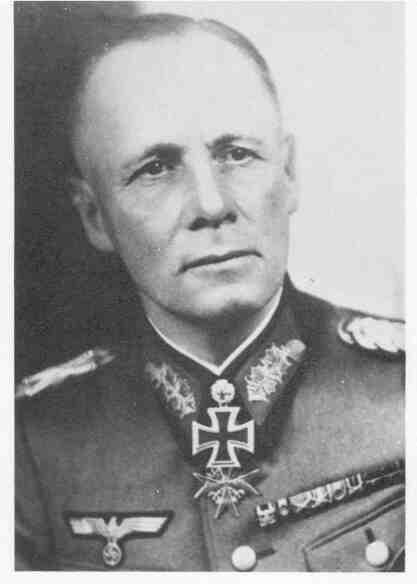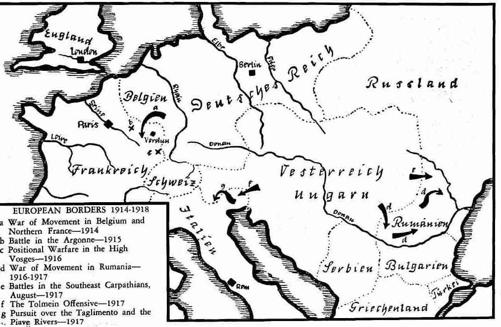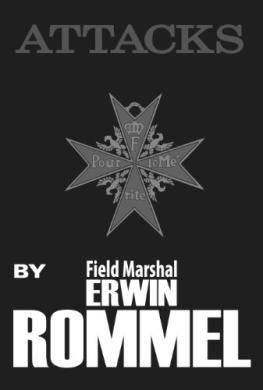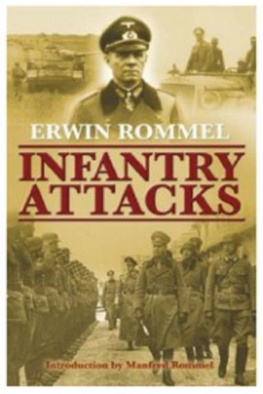Field Marshal ERWIN ROMMEL

European Borders 1914-1918

Publisher's Note
ATTACKS is a classic in military literature. First published in Germany in 1937 under the title Infanterie Greift An, it became a great success before World War II and played a major role in launching Rommel on the road to fame. The book went through at least eighteen printings by 1944, when the legendary soldier was forced to commit suicide because of his implication in the plot against Hitler.
The US Army translated the book in 1943 and General George Patton became familiar with it. Patton was reportedly "electrified" by the book, and read it again and again until he knew it by heart. Other American officers also took a keen interest in the book, and an abridged edition was published in 1944 by the "Infantry Journal" under the title Infantry Attacks.
Today, 35 years after its initial publication in the United States, the book is mentioned frequently as a magnificent account of imaginative and successful combat leadership. Copies of the wartime English edition are among the most valued works in private collections. All copies in the Library of Congress and in the Army Library in the Pentagon have, however, mysteriously disappeared.
This edition of ATTACKS is the first complete and unabridged edition of the book published in the United States. Earlier editions omitted passages potentially embarrassing to our allies as well as a large number of drawings and sketch maps. The Army translation understandably suffered also from a hurried wartime effort.
In preparing this edition J. R. Driscoll retranslated the original German work and revised hundreds of passages in the Army translation. Bob Heittman, working with the German wartime English editions, painstakingly revised the sketches and sketch maps. Where possible they were compared to large scale maps of the areas involved to resolve questions of detail and provide approximate scales. In a few instances additional details have been added. The drawings of scenes are taken from the original and may have been done by Rommel himself.
As the autobiographical record of a Great Captain, ATTACKS is a book of historical interest and importance. In tracing Rommel's development from a green lieutenant to a confident, seasoned and singularly successful commander, it provides keen insight into his mind and character.
It is, as well, an important treatise on combat leadership and psychology, and contains many valuable lessons for those who would raise and train armies. Prime among these lessons is the reminder that men are the key element in combat; that it is the will, spirit and skill of men, led by competent and courageous officers that win battles; that high morale is developed by the accomplishment of difficult tasks.
Sixty-one years after the fact, and forty-two years after writing this book, Erwin Rommel's message is as clear and important today as it was then.
LEE ALLEN
Historical Setting
Europe at the beginning of 1914 was deceptively quiet. Under a thin veneer of peace, stresses and strains had developed that would soon rip the existing structure of nations apart.
On the continent, Germany had attained dominance as a result of its success in the Franco-Prussian War of 1870 and its rapid industrialization. By 1914 she had established an overseas empire and a navy to protect it. She had become a world power on a collision course with other European powers.
France had recovered rapidly after 1870 but the humiliation of her defeat and loss of Alsace and Lorraine were not forgotten. By 1914 France was second in power only to Germany on the continent and was looking for revenge.
The British had become increasingly fearful of the threat Germany's navy posed to their empire.
In the east there was constant friction between Russia and the Austro-Hungarian Empire which was in the final stages of a long decline in power. National aspirations in the Balkans and especially in Serbia, which laid claim to portions of Austria, were a particular point of irritation. Russia, anxious to extend its influence to the Balkans and thence to the Dardanelles and the Mediterranean Sea, sided with Serbia against Austria.
Russia also had an interest in the dismemberment of the Turkish Empire and had supported the successful efforts of several Balkan states to force Turkey out of most of her European provinces in 1913. Turkey, for her part nurtured a deep hatred for Russia.
By 1914 Germany, Austria and Italy had established the Triple Alliance and England, France and Russia formed the contending Triple Entente. All set about preparing for war. The tensions that developed needed only triggering to plunge Europe into war. The murder of Austrian Archduke Franz Ferdinand and his wife by a Serbian assassin on June 28, 1914 was the trigger.
A complex series of ultimatums, mobilizations and war declarations followed. Austria declared war on Serbia. Germany demanded Russia halt its mobilization and when the demand was ignored declared war on Russia and France, which was committed to honoring its alliance with Russia. The German invasion of Belgium (at which point this book begins) brought England into the war.
By August 4th Germany and Austria (The Central Powers) were at war with the AlliesBelgium, Britain, France, Russia and Serbia. Italy remained neutral, claiming that it was obliged to assist the other members of the Triple Alliance only if they were attacked.
Later Turkey and Bulgaria sided with the Central Powers; Italy, Rumania, the United States and others joined with the Allies.
Rommel's experience in the war was unusual in its scope. He served in Belgium, France, Rumania, Austria and Italy and fought the French, Russians, Rumanians and Italians. His story begins on July 31, 1914, the eve of war.
Departure
Ulm, July 31, 1914 - The danger of war hung ominously over the German nation. Everywhere, serious, troubled faces! Unbelievable rumors which spread with the greatest of rapidity filled the air. Since dawn all public bulletin boards had been surrounded. One extra edition of the papers followed the other.
At an early hour the 4th Battery of the 49th Field Artillery Regiment hurried through the old imperial city. Die Wacht am Rhein resounded in the narrow streets.
I rode as an infantry lieutenant and platoon commander in the smart Fuchs Battery to which I had been assigned since March. We trotted along in the bright morning sunshine, did our normal exercises, and then returned to our quarters accompanied by an enthusiastic crowd whose numbers ran into thousands.
During the afternoon, while horses were being purchased in the barrack yard, I obtained relief from my assignment. Since the situation appeared most serious, I longed for my own regiment, the King Wilhelm I, to be back with the men whose last two years of training I had supervised in the 7th Company, 124th Infantry (6th Wrttemberg).
Along with Private Hanle, I hurriedly packed my belongings; and late in the evening we reached Weingarten, our garrison city.
On August 1, 1914, there was much activity in the regimental barracks, the big, old cloister building in Weingarten. Field equipment was being tried on! I reported back to headquarters and greeted the men of the 7th Company whom I was to accompany into the field. All the young faces radiated joy, animation, and anticipation. Is there anything finer than marching against an enemy at the head of such soldiers?











